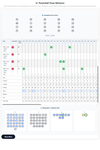
Let’s talk about the future. Not just the one we want but the one we’re building right now. Artificial intelligence is accelerating at a pace we can barely keep up with, and with that speed comes responsibility. It’s not enough to be impressed by AI’s capabilities—we must ensure it serves the public good. We have to ensure it is ethical, fair, and transparent. And right now, we are dangerously close to letting that responsibility slip away.
A handful of corporate behemoths — powerful, resource-rich tech giants such as Meta, OpenAI, or Microsoft — are setting the course for AI’s future. They control the computing power. They control the datasets. They decide who gets access, who gets to build, and who gets left behind. That should give all of us pause. Because if AI is to be the transformative force we all believe it can be, it cannot be dictated by shareholder meetings and quarterly earnings reports. The internet has generally been a force for good because of open standards, transparent development, and lower costs as it scaled in size. AI has yet to demonstrate similar qualities.
That is why Project Robbie is more than a platform. It’s a safeguard. It’s an assurance that AI remains a force for scientific discovery, not just an instrument of commercial interest.
The Growing Concern: AI Without Ethical Oversight
AI is powerful, but let’s not kid ourselves—it is not inherently good. It does what we program it to do and sometimes what we don’t program it to do. It reflects the biases of its training data, amplifies its creators' priorities, and often operates in ways even its developers don’t fully understand. It generates responses based on a non-deterministic probability gradient, influenced but not controlled by its creators’ objectives.
Now, if AI development is controlled exclusively by corporations, let me ask you—who is making sure it is fair? Who ensures it is accountable? Some of the most significant issues we’re facing today include:
Lack of Transparency: Black-box algorithms that make high-stakes decisions with no way for the public to understand, challenge, or correct them.
Bias and Fairness Issues: Training data that does not represent the full scope of humanity, leading to discrimination in hiring, lending, healthcare, and more.
Lack of Accountability: AI systems that go unchecked because their creators are more concerned with market dominance than with ethical concerns.
If we don’t act now, we will wake up in a world where AI is built to serve the few, not the many. And that is unacceptable.
How Project Robbie Keeps AI in Check
Project Robbie isn’t just here to provide access to computing power. It’s here to keep AI research open, ethical, and aligned with the public interest. It does this in five key ways:
1. Democratizing AI Research
The single biggest roadblock to ethical AI research is access to computing power. Training AI models requires enormous GPU resources, and if you don’t work for one of the big players—good luck getting it.
Project Robbie changes that. With on-demand access to high-performance GPUs from the MassOpen Cloud sponsored by Boston University and Harvard, including NVIDIA A100s and H100s, Robbie ensures that AI research isn’t locked away in Silicon Valley. It ensures that universities, independent researchers, and public institutions have the same computing power as the biggest tech firms. That’s how you level the playing field.
2. Supporting Open-Source AI Development
We all know what happens when innovation is driven by secrecy: it stops being innovation and starts being power. The most important breakthroughs in AI should be transparent, peer-reviewed, and open to challenge.
But right now, corporate AI models are proprietary. They cannot be independently audited. They cannot be thoroughly scrutinized. Robbie supports open-source AI research, ensuring that scientists and academics can build models subject to ethical review, public discussion, and real accountability.
3. Enabling Ethical Audits and Bias Testing
We’ve seen it before—AI models that promise fairness but reinforce harmful biases. A few examples include hiring tools that favor one demographic over another, healthcare algorithms that fail to serve underrepresented communities, and facial recognition software that misidentifies people of color at alarming rates.
Robbie gives researchers the ability to test and audit AI systems for bias. Universities and institutions can run experiments to determine whether a model meets ethical standards. That means AI that serves everyone—not just those it was designed to prioritize.
4. Encouraging Cross-Disciplinary Research on AI Ethics
AI is not just a technological issue—it’s a societal one. Yet, the people best equipped to study AI ethics — philosophers, sociologists, and policymakers — often have the least access to the necessary computational tools.
Robbie changes that. Making high-performance computing accessible to researchers outside the tech sphere allows cross-disciplinary teams to analyze AI’s societal impacts in real time. If AI will shape the world, we need every perspective on the table, not just the perspective of the people writing the code. With three steps, a researcher with basic Python skills can audit the latest model directly from a Jupyter notebook. Robbie eliminates IT support, DevOps, and ML engineering support requirements for researchers, making the latest models accessible for experimentation and research.
5. Preventing the Centralization of AI Power
If we allow AI development to be dictated solely by the most significant corporate players, we will have an AI landscape that serves those companies first and everyone else second. That is not how progress works; that is how monopolies work.
Scientific discovery has always involved open collaboration, shared resources, and peer review. That must remain true for AI. Robbie ensures that breakthroughs in AI are accessible, replicable, and accountable. AI should be developed by many, for many—not hoarded by a select few.
The Bottom Line: AI Needs Oversight, and Robbie Provides It
AI is not just a tool of the future—it is shaping the present. And if we want it to be ethical, fair, and transparent, we need to ensure the people developing it have public accountability. That means ensuring that universities, independent researchers, and government institutions have access to the same high-performance computing resources as private companies.
Project Robbie is not just a research tool but a check on power. It allows scientists to conduct unbiased, transparent, and ethical research in artificial intelligence, free from corporate influence and commercial limitations.
If we want AI to serve humanity rather than just the highest bidder, we must build the infrastructure that allows ethical research to thrive. Robbie is that infrastructure. And in a world where AI is shaping our future, the time to act is not tomorrow. It is right now.






